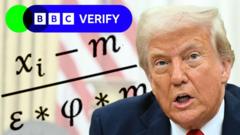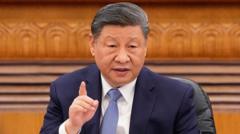In an unforeseen turn of events for the U.K., President Trump’s administration has extended a blanket tariff on British goods, based on recent decisions made after a state visit invitation from King Charles in February. This outcome has left British Prime Minister Keir Starmer reeling, as his charm offensive aimed at securing favorable treatment has seemingly gone unrecognized.
Trump's Tariffs Hit Britain: A Diplomatic Setback for Starmer

Trump's Tariffs Hit Britain: A Diplomatic Setback for Starmer
British PM Keir Starmer's efforts rejected as tariffs are imposed despite royal invitation.
Despite Starmer’s attempts to forge a positive relationship with the U.S. and the perceived advantages from Britain's exit from the European Union, the 10 percent tariff comes amidst a 20 percent tariff on other partners, including the European Union. Supporters of Starmer hailed the lower rate as a minor victory that would safeguard thousands of jobs, but critics emphasize the underlying contradiction in the U.S.-U.K. trade dynamics, which still result in a hefty tariff effect on Britain.
Moving forward, the question of how to address this setback remains. Starmer has indicated a commitment to maintaining composure, insisting that the U.K. would not engage in retaliatory tariffs while negotiations unfold. Economic experts, like Jonathan Portes from King’s College London, urge caution; the Prime Minister must balance diplomacy with the need to protect national interests. The stakes are high as the U.K. navigates this complex international landscape following a significant political reroute.
As discussions continue, attention turns to whether Starmer can maintain his strategy without veering into needless confrontation while also seeking to protect the U.K.’s economic interests against American tariff repercussions.
Moving forward, the question of how to address this setback remains. Starmer has indicated a commitment to maintaining composure, insisting that the U.K. would not engage in retaliatory tariffs while negotiations unfold. Economic experts, like Jonathan Portes from King’s College London, urge caution; the Prime Minister must balance diplomacy with the need to protect national interests. The stakes are high as the U.K. navigates this complex international landscape following a significant political reroute.
As discussions continue, attention turns to whether Starmer can maintain his strategy without veering into needless confrontation while also seeking to protect the U.K.’s economic interests against American tariff repercussions.





















